




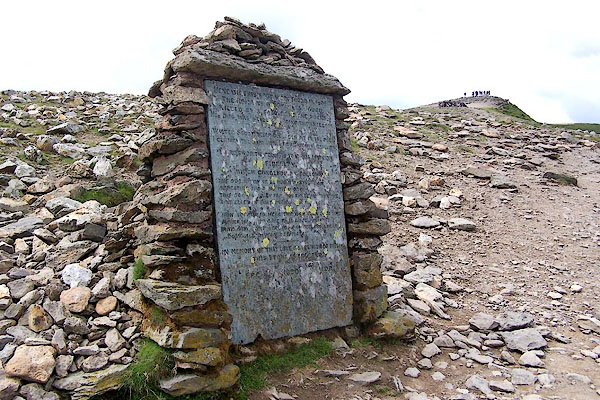
BRB58.jpg (taken 9.7.2009)
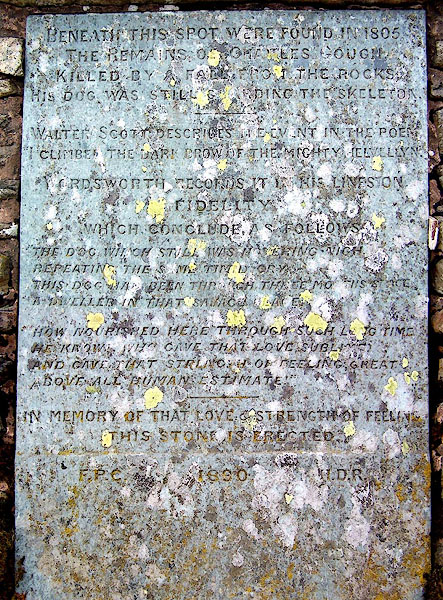
BRB59.jpg (taken 9.7.2009)
THE REMAINS OF CHARLES GOUGH
KILLED BY A FALL FROM THE ROCKS.
HIS DOG WAS STILL GUARDING THE SKELETON.
WALTER SCOTT DESCRIBES THE EVENT IN THE POEM
I CLIMBED THE DARK BROW OF THE MIGHTY HELVELLYN
WORDSWORTH RECORDS IT IN HIS LINES ON
'FIDELITY'
WHICH CONCLUDES AS FOLLOWS
'THE DOG WHICH STILL WAS HOVERING HIGH
REPEATING THE SAME TIMID CRY
THIS DOG HAD BEEN THROUGH THREE MONTHS SPACE
A DWELLER IN THAT SAVAGE PLACE
HOW NOURISHED HERE THROUGH SUCH LONG TIME
HE KNOWS, WHO GAVE THAT LOVE SUBLIME
AND GAVE THAT STRENGTH OF FEELING GREAT
ABOVE ALL HUMAN ESTIMATE.'
IN MEMORY OF THAT LOVE &STRENGTH OF FEELING
THIS STONE IS HERE ERECTED
F.P.C. 1890 H.D.R."
item:- accident; dog
 goto source
goto sourcepage xxi "... the fate of a young man, a stranger, who perished some years ago, by falling down the rocks in his attempt to cross over to Grasmere. His remains were discovered by means of a faithful dog that had lingered here for the space of three months, self-supported, and probably retaining to the last an attachment to the skeleton of its master. ..."
 goto source
goto sourcePage 46:- "... [Helvellyn] at its foot are Keppel Cove Tarn and Red Tarn, on the edge of which Gough's remains, after having been watched over by his dog, 'through three months' space,' were accidentally found by a shepherd; ..."
item:- costume; horse; memorial
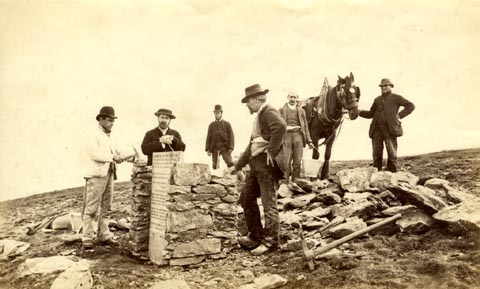 click to enlarge
click to enlargeHB0603.jpg
item:- Armitt Library : ALPS263
Image © see bottom of page
item:- memorial
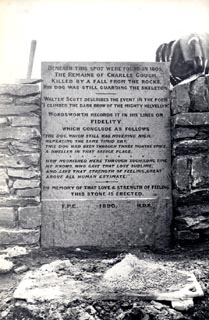 click to enlarge
click to enlargeHB0604.jpg
stamped on reverse:- "HERBERT BELL / Photographer / AMBLESIDE"
item:- Armitt Library : ALPS264
Image © see bottom of page
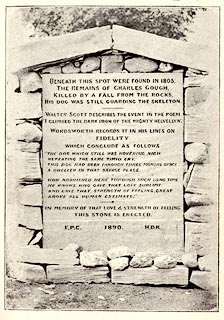 click to enlarge
click to enlargeHRW304.jpg
Tipped in opposite p.40 of the History and Description of the Thirlmere Water Scheme, by Sir John James Harwood.
item:- Armitt Library : A660.6
Image © see bottom of page
When the wind waved his garment how oft didst thou start?
How many long days and long nights didst thou number
Ere he faded before thee the friend of thy heart?"
